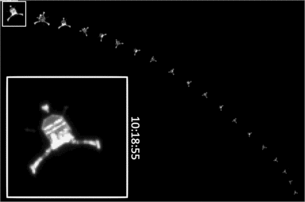Chances of further communication with satellite Fila approach zero

Descent of the Fila probe to the comet
The team working on the Fila project, the descent vehicle that landed on the comet Churyumov-Gerasimenko in November 2014, regrets that the probe is most likely lost to humanity. Fila has not called home since July 9, 2015, and, apparently, this was the last contact with him.
“The chances that Fila will contact our team through the control center are unfortunately approaching zero,” says Stephan Ulamec, project manager at the German space mission center. “We no longer send him any commands and would be very surprised if we received any news from him.”
At the same time, the Rosetta spacecraft, which delivered the probe to the comet, continues to benefit science by cutting circles around the celestial body. Her work will last until September, when the device will also be sent to meet with a comet, and has already yielded interesting results. For example, it turned out that the comet’s ice contains three times as much heavy water as compared to the Earth’s oceans. This result contradicts the generally accepted theory that the Earth’s water is of comet origin. An
international team of engineers, consisting of specialists from the space centers of Germany, France and Italy, sorted out the state in which the Fila probe was located, sorting out the information received from the very moment of its historical landing on a comet.
The mission went according to plan until the probe touched the surface of the comet. For reliable fixing to the surface it had to be pressed by a rocket engine, while it had to be hooked on the surface by harpoons and gimlets. But the engine did not work, and as a result, the probe, scrolling along the comet, froze in such an unfortunate position that the solar panels do not receive enough energy for its normal functioning.
During short communication sessions, scientists still managed to get some valuable information - for example, particles containing complex organic compounds were found on the surface of a comet .
